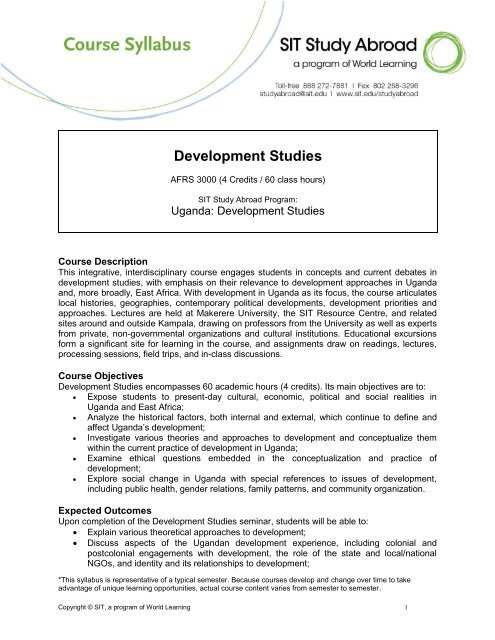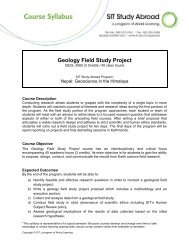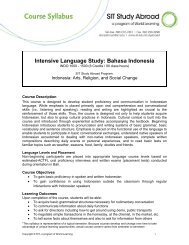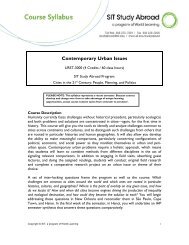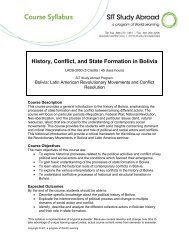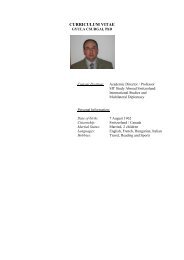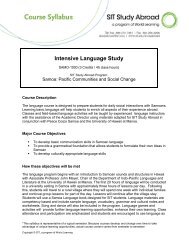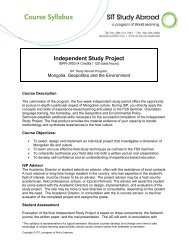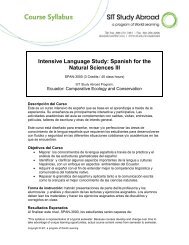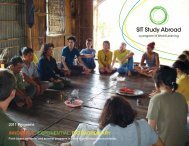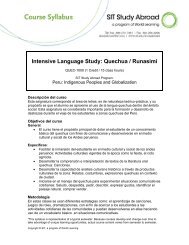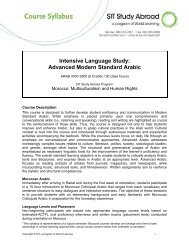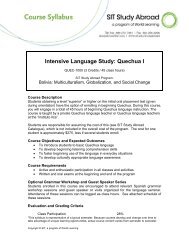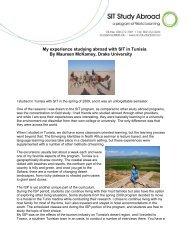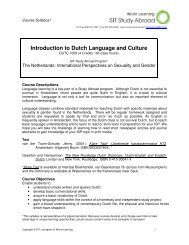Development Studies Seminar - School for International Training
Development Studies Seminar - School for International Training
Development Studies Seminar - School for International Training
Create successful ePaper yourself
Turn your PDF publications into a flip-book with our unique Google optimized e-Paper software.
the AD), b. discussions with academics and professionals; c. additional written sources. Thereport should provide a brief discussion of the issue(s) followed by assessment/analysis.Case Study: Building on the elective, each student will choose a topic to explore in greaterdetail, using the lectures, readings, and site visits of the course to further augment the electivestudy. To successfully situate each case study, students will need to put the topic in a broaderdevelopment context and consider the specifics of each in relationship to Uganda. A separatehandout will be provided with additional details. Sample case study topics are listed below:Case Study 1:Biofuels, food security, and resource nationalism in UgandaCase Study 2:Chinese investment in UgandaCase Study 3:Political decentralization and its relationship to developmentCase Study 4:Faith-based organizations and HIV/AIDS prevention in UgandaCase Study 5:Gender mainstreaming as key to development in UgandaCase Study 6:<strong>Development</strong> as a “human right”Participatory Rural Appraisal/Rapid Rural Appraisal (PRA/RRA) village stay paper: Students willbe placed in pairs in selected homestays in Busia or Kapchorwa in eastern Uganda. Studentswill be expected to work independently of the AD and to plan and implement their own individualassignment. Preparation <strong>for</strong> the assignment will be made prior to the village stay (as acomponent of the Practicum <strong>Training</strong> and Ethics course). For the PRA/RRA paper, students willselect one of the following broad topics with the goal of narrowing the topic further <strong>for</strong> a shortstudy during the village stay. Each student will have their own specific topic. This assignmentwill <strong>for</strong>ce you to focus – your topic and questions must be succinct, given the limited time you‟llhave to complete the fieldwork. The final product will be a 6-8 page typed paper. A separatehandout will provide additional in<strong>for</strong>mation. Below are suggested thematic areas:EducationHealth careIndigenous knowledgeAgricultural productionProduct marketing and pricingCultural norms and gender rolesThe local council systemLocal resourcesDiscussion Leadership: Student-led processing sessions are held weekly to discuss lectures,site visits, and readings, as well as any related observations and cultural cues encountered overthe week. The purpose of the processing sessions is to provide a student-driven <strong>for</strong>um to share,examine, assess, and analyze experiences on a weekly basis. In pairs, you will facilitate a 1-1½hour session (there is no written assignment) during which you will briefly summarize the week‟s*This syllabus is representative of a typical semester. Because courses develop and change over time to takeadvantage of unique learning opportunities, actual course content varies from semester to semester.Copyright © SIT, a program of World Learning 3
module (public health, gender and development, or politics and grassroots development), areincluded as part of the <strong>Development</strong> <strong>Studies</strong> <strong>Seminar</strong>.<strong>Development</strong> in Theory:1. Introduction to <strong>Development</strong> <strong>Studies</strong>Theoretical and conceptual aspects of development studies: development studies as afield of practice and as a field of study, competing approaches and perspectives indevelopment studies, discourses of development.Chambers, R. 1993. Challenging the Professions: Frontiers <strong>for</strong> Rural <strong>Development</strong>.Warwickshire, U.K.: Intermediate Technology <strong>Development</strong> Group Publishing.Kothari, U. 2005. A Radical History of <strong>Development</strong> <strong>Studies</strong>: Individuals, Institutions andIdeologies. London: Zed Books.Smith, M. 2006. Discourses on <strong>Development</strong>: Beyond the „African Tragedy.‟” In Smith,M., Ed., Beyond the ‘African Tragedy:’ Discourses on <strong>Development</strong> and theGlobal Economy. Aldershot, UK: Ashgate. Chapter 1, pp. 1-24.Uphoff, N., Esman, M.J. and Anirudh K. A. 1998. Reasons <strong>for</strong> Success: Learningfrom Instructive Experiences in Rural <strong>Development</strong>. Bloomfield, CT: KumarianPress.2. Theories of <strong>Development</strong>Modernization and dependency theories, socialist and state-led approaches todevelopment, structural adjustment, and neoliberalism.Owusu, F. 2006. Discourses on <strong>Development</strong> from Dependency to Neoliberalism. InSmith, M., Ed. Beyond the ‘African Tragedy:’ Discourses on <strong>Development</strong> andthe Global Economy. Aldershot, UK: Ashgate. Chapter 2, pp. 25-48.So, A. Y. 1990. Social Change and <strong>Development</strong>: Modernization, Dependency andWorld Systems Theories. Thousand Oaks, CA: SAGE Press, pp. 17-31 (Chapter2), 91-109 (Chapter 5), and 169-199 (Chapter 8).3. Aid, Trade, and Rethinking <strong>Development</strong>Moyo, D. 2009. Dead Aid: Why Aid is Not Working and How there is Another Way <strong>for</strong>Africa. New York: Farrar, Straus and Giroux.Sachs, W. 2010. Introduction. In Sachs, W., Ed., The <strong>Development</strong> Dictionary: A Guideto Knowledge as Power, 2 nd ed. New York: Zed, pp.xv-xix.<strong>Development</strong> in Practice (example lectures, subject to change):1. Geography, Environment, and Ethnic Groups of UgandaUganda‟s physical geography and climate and how they influence development, differentethnic groups and their relationship to the social and political set up in Uganda.2. Uganda’s History: Pre-Colonial to the Present*This syllabus is representative of a typical semester. Because courses develop and change over time to takeadvantage of unique learning opportunities, actual course content varies from semester to semester.Copyright © SIT, a program of World Learning 5
Uganda‟s experience with colonialism and how this has influenced the social, economic,and political systems. The struggles/conflicts between traditional and colonialinstitutions. The post-independence political upheavals and possible explanations.3. Constitutionalism and Constitutional Re<strong>for</strong>ms in Uganda since IndependenceConstitutionalism in Uganda, the different constitutional re<strong>for</strong>ms since independence,and the prospects <strong>for</strong> the present constitutional regime.4. The Role of NGOs in Uganda’s <strong>Development</strong>A description of the NGO sector in Uganda, its emerging role as a provider ofdevelopment assistance, funding alternatives, strengths and weaknesses.5. The Peace Process and Current Issues in the LRA/Government ConflictHistory of the northern insurgency, its causes, impacts and plausible solutions, and thelocal/internal and international dimensions of the problem.6. Uganda’s Health Care SystemIn<strong>for</strong>mal and <strong>for</strong>mal health care providers. Structure, management and administration ofUganda‟s health care system. Sources of funding. Strengths and weaknesses of thesystem.7. Uganda’s Education SystemStructure, management, funding, curricula, weaknesses and/or strengths of theeducation system in Uganda.8. Gender and <strong>Development</strong>: The Role of Uganda’s Gender PolicyA situation analysis, Uganda‟s gender policy, government‟s ef<strong>for</strong>ts, barriers, andprospects.9. Environment and <strong>Development</strong>An overview of the key natural resources in Uganda is provided, followed by an analysisof institutional frameworks in environmental conservation and wise resource use.10. The Role of Parliament in Uganda’s <strong>Development</strong>Structure, composition and election of parliamentarians, strengths, weaknesses,constraints and opportunities parliament has in driving development.Student ExpectationsClass ParticipationParticipation in class refers to attendance, punctuality, attentive listening and activeengagement in all lectures, discussions, educational excursions and other activities. It alsomeans polite and respectful behavior.Please refer to the SIT Study Abroad handbook <strong>for</strong> policies on academic integrity, ethics,warning and probation, diversity and disability, sexual harassment and the academic appealsprocess. Also, refer to the specific in<strong>for</strong>mation available in the Student Handbook and theProgram Dossier given to you at orientation.*This syllabus is representative of a typical semester. Because courses develop and change over time to takeadvantage of unique learning opportunities, actual course content varies from semester to semester.Copyright © SIT, a program of World Learning 6


